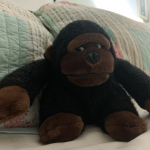Hear the Birdie?
If there are many things that lift the heart faster than making a child laugh, I can’t name them. The other day I tried a little trick with the grandkids with a bit of an ulterior motive, and it got a better laugh than I expected.
Hey, Buddy, I said casually, do you hear the birds chirping? Sitting across from me at the table and drawing while I was looking at a catalogue, he turned to look out the window. I tugged quickly on my right ear, fast enough that he didn’t see the motion, which generated a tiny, bird-like squeak.
He spun back around toward me, searching my face for clues. “I don’t see a bird out there,” he said. Look again, I responded, pointing out the window. As he did, I tugged on the ear again, repeating the little chirp. Almost nine years old and nobody’s fool, my grandson examined my expression again, analyzing the prank he smelled. “You’re making that noise,” he conjectured. “How did you do that?”
Oh, it’s a special bird-chirping magic trick, I began, and then relented under his analytical gaze. Actually, it’s my hearing aid. The one on this side makes a little feedback sound if you adjust the position of the tip. Sounds like a birdie, doesn’t it?
“It does!” he agreed, laughing. “That’s pretty cool.” Later, I demonstrated for his younger sister, with similar success.
Ever since my two grandchildren grew old enough to converse, I have worried that my severe hearing loss would strain the fabric of our relationship. Young children are generally hard to understand for most adults, even for those with normal hearing. For those of us who live daily with significant hearing impairments, it can be darn near impossible. As it happens, that encompasses a very large group of people.
According to the National Institute on Deafness, an arm of the National Institutes of Health, one in eight people in this country aged 12 or older has hearing loss in both ears—that’s 13 percent of the population, a whopping 30 million people. For those of us in grandparent age-range, the rate of disabling loss nearly doubles to 25 percent of individuals past 64, and it rises to a full HALF of senior adults age 75 and older. Another national research institution ranks age-related hearing loss as the fifth-highest debilitating condition in the world, behind only low-back pain, migraine, major depression, and diabetes. That’s a whole, whole lot of people who might be in line with us at the grocery store or down the aisle at the movies or waiting patiently in the early voting line who may struggle to understand any audio cues or words at any given time.
Family history, as in so many things, may also dictate the course of hearing disability. We have a very strong family pattern for hearing loss on my father’s side of the family, beginning much younger than average. In an effort to resist career setbacks or disrupted relationships, I acquired my first aids long before I was 50. As with most technology in the digital age, aids are getting better all the time, with capabilities that adjust for infinite variations in sound. Still, as with other disabilities, it is a constant challenge to maneuver daily life.
Struggles range from the tiny to the enormous. Aids cannot compensate for the direction of sound, so if someone turns from you on a noisy street, their words blow away in the wind. Whispering in the movie theatre? Forget it. Background music at your friend’s dinner party? Torture, unless you prefer to dodge the conversation. That acclaimed expert speaker you went to hear, when you bought that expensive ticket and queued up early for a good seat—that presentation was completely lost, an experience equivalent to watching TV with the sound off. The speaker said, “Can everyone hear me?” And when no one said no, he walked away from the microphone because he didn’t like to use it.
Some, like my father in his later years, largely give up in group situations rather than asking people to repeat and fearing that’s a burden to others. Even the kindly friends and family members who are aware cannot possibly catalogue and accommodate for all the varying conditions that may isolate a hearing-impaired person from his surroundings. Decades after the Americans with Disabilities Act created requirements for physical access and other important accommodations, hearing loss—as distinguished from deafness—is the secret disability. My own theory is simple: It’s because it is invisible. Some days, it is like walking around inside a glass capsule that defines your freedoms but is unseen by everyone you meet.
So, how to deal with children that you love? Their little voices and unconstructed sentences and funny stories are so precious to the ears and heart. Some days I have shivered with anxiety, worrying these young souls who light up my universe like moonbeams will find my presence irritating, my understanding incomplete or bizarrely twisted, my conversation useless.
For the fundamentals of daily operation, there is gentle coaching. Turn toward me so I can hear you, I coax, as patiently as I can, over and over. I really want to hear you, I sometimes add, hoping it helps, because what you say is important to me. Yes, those words you see on the TV screen are supposed to be there. They are called “captions”, and they show what the speaker is saying, in case I can’t hear it fully. On and on it goes. Hoping that what is routine becomes easier to accept, and not so different or awkward, I openly share the mechanics of the “personal audio system.” I show them how the aids fit into the ear, explaining how I can adjust it by touching a button lightly on the back of the tiny mechanism.
Only once have I received a snarky response from one of the children to my request to repeat something. Maybe because it was so hurtful, maybe because I was tired and out of steam, I elected to meet this full-on.
Repeating yourself may be frustrating sometimes, I say bluntly, right into my grandson’s wary face. But you know my ears don’t work well, that I can’t hear what you guys can hear, and that’s very hard for me. So, the kind thing to do is help me, not make fun of my problem. Don’t ever let me hear you joke about people whose bodies function differently than yours. Would you say something like that to a person in a wheelchair, be mean to them because they couldn’t go up the steps? Of course not. I know you wouldn’t. This is no different. Do you understand?
This rant yielded a remorseful nod, which I took as an apology, and in turn I delivered a hug to seal our peace treaty. Children so seldom intend to be unkind, but sometimes they need help seeing the nuances of reality.
I hope the coaxing and straight talk help in the long run, but the humor may leave the best imprint in the little hearts. The other morning, I was fixing breakfast, and the children were hungry. Sis likes to hover around and help in the kitchen, and suddenly I had to halt the preparations when the battery died in my right hearing aid. Feeling pressed for time and foolishly wrestling the tiny battery into its miniature compartment without my glasses, I forced feedback out of the aid unintentionally a couple of times before getting the battery in place. When accidentally prolonged, the feedback is more of a squeal than a chirp, and it made me cringe. Meanwhile, I mumbled to Sis that the food would be ready soon. Watching intently, she heard the familiar noise, but I didn’t look up when she first commented.
“It’s a nice noise, really, you know.” What is? I asked, still on task and distracted.
“Birdsongs. They’re pleasant sounds, you know, I like them.” This last is attached to a persuasive smile and a little shrug.
Never in a million years would I have risked embarrassing her by probing for the double meaning I fervently hoped was there, even if unintentionally. I had to settle for a big smack of a kiss on her forehead and getting on with breakfast.



